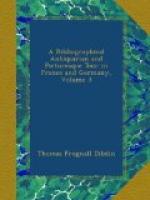[35] Such is ZAPF’S work, entitled Annales
Typographiae Augustanae,
1778; 4to. republished with
copious additions in 1786, two volumes,
4to. The text of the
latter is (unfortunately, for the unlearned)
printed in the German language.
[36] [This Latin Bible came from the Eichstadt Monastery.]
[37] Bibliographical Decameron, vol. iii. p. 115.
[38] See the Bibliographical Decameron, vol. ii. p. 170. &c.
[39] [The first Horace, the Cicero Epist. ad Familiares,
1469, the Latin
Bible by Frisner and Sensenschmidt,
1475 and the Polish Bible of 1563,
(all so warmly and so justly
eulogised in the above pages) have been
reposing these last ten years
in the library of Earl Spencer: and
magnificent and matchless
as is that library, it contains no FINER
volumes than the four preceding.
I conclude this detail by subjoining
the Autographs of the two
BIBLIOGRAPHICAL WORTHIES who have cut such a
conspicuous figure in the
scene above described. The latter is now NO
MORE.]
[Autographs]
LETTER V.
MUNICH. CHURCHES. ROYAL PALACE. PICTURE GALLERY. PUBLIC LIBRARY.
Munich; Hotel of the Black Eagle; Aug. 16, 1818.
MY DEAR FRIEND;
Behold me, now, in the capital of Bavaria: in a city remarkable for its bustle, compared with the other German cities which I have visited, and distinguished rather for the general creditable appearance of the houses and public buildings, than for any peculiar and commanding remains of antiquity. But ere I speak of the city, let me detain you for a few seconds only with an account of my journey thither; and of some few particulars which preceded my departure from Augsbourg.
It turned out as I predicted. “Ere the set of sun,” ensuing my last despatch, I drove to the principal front of this large, comfortless, and dirty inn; and partook of a dinner, in the caffe, interrupted by the incessant vociferations of merchants and traders who had attended the market (it being market day when I arrived), and annoyed beyond measure by the countless swarms of flies, which chose to share my cutlet with me.
On taking a farewell look of Augsbourg, my eyes seemed to leave unwillingly those objects upon which I gazed. The Paintings, the Town Hall, the old monastery of Saints Ulric and Afra, all—as I turned round to catch a parting glance—seemed to have stronger claims than ever upon my attention, and to reproach me for the shortness of my visit. However, my fate was fixed—and I now only looked steadily forward to Munich; my imagination being warmed (you will say “inflamed”) with the thoughts of the countless folios, in manuscript and in print—including block-books, unheard and undreamt of—which




